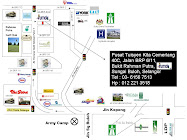介系詞片語 (Prepositional Phrase)
一個介系詞片語包含一個介系詞、一個做為介系詞之受詞的名詞或代名詞 以及 (經常有的情況) 一個或兩個修飾受詞的形容詞。
介系詞片語通常在敘述時間或地點:"in forty minutes," "in the sun, against the side, 等等" 。但介系詞片語也可做其他功能:Except Jo, the children were remarkably like their father.
一個句子開頭的介系詞片語是一種前導修飾語 (introductory modifier),後面通常接一個逗點;然而,除非前導介系詞片語很長,否則我們鮮少在其後加逗點。
你們可能已知悉以介係詞做句子的結尾係嚴重違反文法規則。然而,它是一個很容易讓人「上癮」的寫作規則。雖然我們通常可以輕易地修正此一違反文法的介系詞,但有時則不能,因為修改的結果有時會產生笨拙的句子。根據零碎的歷史先例,這規則本身是最新的寫作規則。不過,不喜歡這個規則的人一定會非常懷念前英國首相,也是1953年諾貝爾文學獎得主的邱吉爾的一句話:"That is nonsense up with which I shall not put." [那 (指上述新規則) 是我無法忍受的胡說八道]。
同位格片語 (Appositive Phrase)
同位格片語係它前面緊鄰的一個字的補充、說明和舖陳。我們通常使用另一種片語來做為同位格片語。
My favorite teacher, a fine chess player in her own right, has won several state-level tournaments. [名詞片語當同位格片語]
The best exercise, walking briskly, is also the least expensive. [動名詞片語當同位格片語]
Tashonda's goal in life, to become an occupational therapist, is within her grasp this year, at last. [不定詞片語當同位格片語]
獨立片語 (Absolute Phrase)
一個獨立片語 (亦稱為獨立分詞 nominative absolute -- 有人稱為"獨立主格" -- 片語)通常是 (並非總是)一組包含一個名詞或代名詞和一個分詞以及任何相關修飾語的字。獨立片語並非修飾主句中某一特定字,且跟它們都沒有直接關係;反之,獨立片語係修飾整個句子、附加資料。它們都被視為插入語句,因此用一個逗點或一對逗點 [有時是一個破折號 (--) 或一對破折號] 與句子的其他部分分開。注意:獨立片語包含一個主詞 (通常被分詞所修飾),但不含真正的動詞。
Their reputation as winners secured by victory, the New York Liberty charged into the semifinals.
The season nearly finished, Rebecca Lobo and Sophie Witherspoon emerged as true leaders.
The two superstars signed autographs into the night, their faces beaming happily.
當獨立片語的分詞是 to be 的型態時,如 being 或 having been,這個分詞往往被省略,但其意自明。
The season [being] over, they were mobbed by fans in Times Square.
[Having been] Stars all their adult lives, they seemed used to the attention.
另一種獨立片語是位在一個被修飾的名詞後面;它使主要子句語意所強調的重點凸顯出來。這種獨立片語可以介系詞片語、形容詞片語或名詞片語的型態出現。
The old firefighter stood over the smoking ruins, his senses alert to any sign of another flare-up.
His subordinates, their faces sweat-streaked and smudged with ash, leaned heavily against the firetruck.
They knew all too well how all their hard work could be undone -- in an instant.
獨立片語中所提供的資訊有時是句子中最重要的。事實上,在敘述性文章中,最重要的部分往往被 "包裹成"具有獨立片語型態的句子:
Coach Nykesha strolled onto the court, her arms akimbo and a large silver whistle clenched between her teeth.
The new recruits stood in one corner of the gym, their uniforms stiff and ill fitting, their faces betraying their anxiety.
名詞片語亦可以獨立片語的形式出現:
Your best friends, where are they now, when you need them?
And then there was my best friend Sally -- the dear girl -- who has
certainly fallen on hard times.
不定詞片語 (Infinitive Phrase)
一個不定詞片語包含一個不定詞 -- to + 原形動詞 -- 及任何與其相關的修飾語或補語 (complements)。不定詞片語可當作形容詞、副詞和名詞。
Her plan to subsidize child care won wide acceptance among urban politicians. [修飾 plan,當作形容詞]
She wanted to raise taxes. [名詞 -- 句子的受詞]
To watch Uncle Billy tell this story is an eye-opening experience. [名詞 -- 句子的主詞]
To know her is to love her. [名詞,當作主詞補語]
Juan went to college to study veterinary medicine. [這個不定詞片語告訴我們 Juan 為何要上大學,所以它是副詞]
動名詞片語 (Gerund Phrase)
在動名詞片語中,動名詞 (動詞加 ing,當名詞用) 通常與修飾語和補語有關連。這些片語具備名詞的所有功能。注意:其他片語,尤其是介系詞片語,通常是動名詞片語的一部份。
Cramming for tests is not a good study strategy. [動名詞片語當主詞]
John enjoyed swimming in the lake after dark. [動名詞片語當受詞]
I'm really not interested in studying biochemistry for the rest of my life. [動名詞片語當介系詞 in 的受詞]
分詞片語 (Participial Phrase)
現在分詞 (動詞加 ing)和過去分詞 [動詞加 ed (對規則動詞而言)或其他型態 (對不規則動詞而言)] 結合補語和修飾語,形成重要的片語結構。分詞片語都是當作形容詞用。當分詞片語放在句子的開頭時,它們通常被一個逗點分開 (做為前導修飾語);否則,如果分詞片語是插入語句,那麼它們要由一對逗點來分開。
The stone steps, having been worn down by generations of students, needed to be replaced. [修飾 "steps"]
Working around the clock, the firefighters finally put out the last of the California brush fires. [修飾 "firefighters"]
The pond, frozen over since early December, is now safe for ice-skating.
skip to main |
skip to sidebar



pusattuisyenkitacemerlang@yahoo.com
We provide 1. Quality Teaching To Encourage Your Child's Learning Desire. 2. Quality Learning To Build Your Child's Self Confidence. 3.Quality Growing To Shape Your Child's Future. Email: pusattuisyenkitacemerlang@yahoo.com
Principal

Motivator and Academic Counselor

Location

pusattuisyenkitacemerlang@yahoo.com
Sharing Subjects
- Adat Melayu (6)
- B.Melayu - Karangan (1)
- KC 伟 杰 课 室 (25)
- KC 伟 杰 课 室 Proverb (17)
- KC 伟 杰 课 室 Reborn (15)
- KC 伟 杰 课 室- Travel (1)
- KC 伟 杰 课 室-出国留学 (14)
- KC 伟杰课室 - 教育 (10)
- KC 伟杰课室学习 (8)
- Kita Cemerlang (12)
- Kita Cemerlang - Sharing (106)
- Kita Cemerlang 雙溪毛糯- Work? (10)
- Komsas (6)
- Math Reference Tables (10)
- Maths Olympics (8)
- Photos (4)
- PMR - BM作文 (12)
- PMR - 华文 (17)
- PMR - 华文作文 (25)
- PMR - 英语 (1)
- PMR - 英语作文 (6)
- PMR-华语-孔子 (4)
- Science - Chemistry (9)
- SPM - B. M-Tatabahasa (2)
- SPM - BM作文 (20)
- SPM 华文 (4)
- SPM 华文作文 (3)
- STPM 华文 (4)
- STPM 华文作文 (1)
- Teacher (7)
- UPSR - 华语 (2)
- UPSR - 华语作文 (54)
- UPSR - 成语故事 (9)
- UPSR B.English (13)
- UPSR B.English - Grammar (28)
- UPSR B.English - Story (7)
- UPSR B.English Essay (16)
- UPSR B.M- Nilai Murni (5)
- UPSR B.Melayu (3)
- UPSR B.Melayu - Karangan (15)
- UPSR B.Melayu - Tatabahasa (20)
- UPSR Mathematic (11)
- UPSR- 华语 (39)
- UPSR- 华语古文 (21)
- UPSR- 科学 (17)